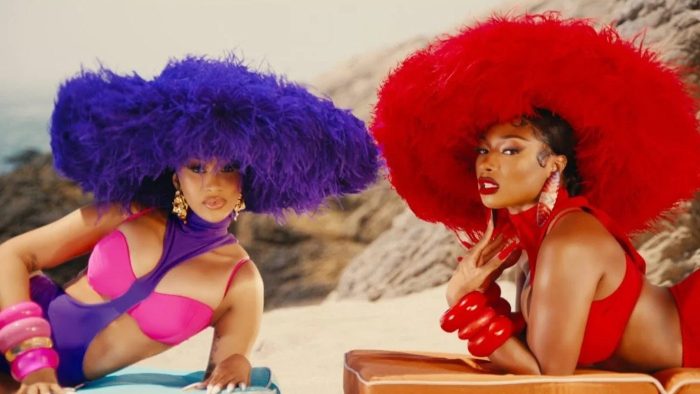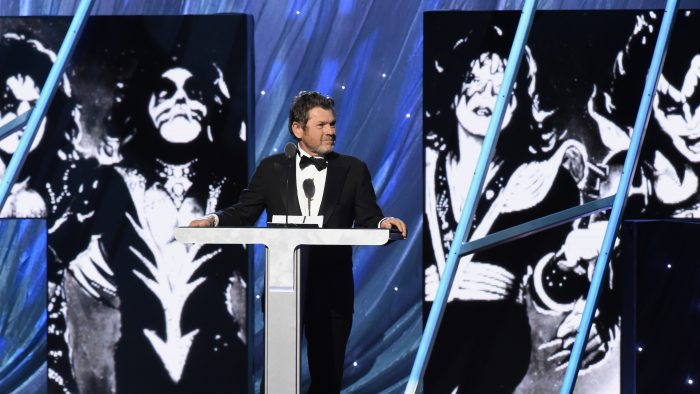Recently, Rolling Stone magazine co-founder Jann Wenner sat down for an interview with The New York Times in which he explained why he only included white men in his book, The Masters, which includes seven interviews with rock ’n’ roll legends. Wenner asserted that no female artists were “as articulate enough on this intellectual level,” and said Black musicians “didn’t articulate at that level” either. As someone who has shaped American discourse about rock ’n’ roll and music journalism, Wenner said the quiet, discriminatory and hurtful parts that Black folks have always known out loud.
From Chuck Berry to Little Richard to Rosetta Tharpe, who was key in the creation of rock ’n’ roll, you can’t talk about the origins of the genre without talking about Black artists. In the decades since, though, rock ’n’ roll has become associated with many of the white men Wenner has highlighted in his book, such as Mick Jagger and Bruce Springsteen. This is, of course, a result of systematic whitewashing and the elimination of Black voices from the genre. Wenner, as the co-founder of Rolling Stone, was a central force in that whitewashing.
It was largely Wenner’s editorial decisions that led to decades of white men on the cover of a magazine about rock ’n’ roll — though Tina Turner was featured on the cover of the second issue of the magazine in 1967. It was Wenner, after all, who sent Michael Jackson a letter rejecting him for a magazine cover after the release of Off The Wall, one of the bestselling albums of all time. It’s largely been Wenner’s decisions that created barriers to entry for Black music journalists as well. Wenner has been the gatekeeper of his publication — and rock ’n’ roll in America — blocking Black folks while leaving the backdoor wide open for his white male cronies.
‘Invisible Beauty’ shows how Bethann Hardison changed the model for beauty in fashionRead now
Wenner isn’t just saying the quiet parts out loud, he’s validating the experiences of Black and female artists and journalists who have felt locked out of an industry and coverage we knew we were qualified for.
Wenner’s comments were painful because, like so many Black folks, I’ve had them said to me. Years ago, I sat in the dean’s office at a journalism department where I was the only Black male student. I was asking her why she wouldn’t allow me in the magazine writing track — which didn’t actually have an application process. You just picked the program and joined. But this particular dean had it in her mind that I shouldn’t be in magazine writing.
Why?
“I just don’t think you’re as strong a writer as you think you are,” she said. She didn’t even look me in the eye when she said it.
“Have you read anything I’ve written?” I asked. By this time, I’d not only been writing articles for my classes, but I was also writing full time at The Smoking Section, a popular hip-hop blog, and freelancing for The Jackson Free Press.
She admitted she hadn’t.
 Tony! Toni! Toné! is back — and it feels goodRead now
Tony! Toni! Toné! is back — and it feels goodRead now
Like the dean, Wenner served as a barrier that kept Black people away — not because of merit or a lack of acumen — but by some arbitrary notion of who deserves space. And that notion is often race-based. This isn’t just confined to the artists the magazine covered. It’s also about the people they hired. If Stevie Wonder doesn’t have the acumen to be considered a master, what chance does a 23-year-old Black kid who wants to cover the music have?
What struck me as an added insult here is that Wenner allowed his friendships to influence and even dictate his journalism. He allowed artists such as Bono and John Lennon to edit their own interviews. He went into business with Jagger to open a British edition of Rolling Stone. These practices would get me fired and get any journalism student kicked out of their program.
With one interview Wenner invalidated every institution he’s ever touched in the music and journalism industry. That includes his supposed vanity project, the Rock & Roll Hall of Fame, which has been woefully inadequate in its representation of Black and female luminaries. His words confirm what we suspected about him and the coverage and favors he handed out. The people Wenner amplified as the masters of art are beneficiaries of a white, male buddy system.
 The insecure man’s guide to hating UsherRead now
The insecure man’s guide to hating UsherRead now
It’s further proof that these publications and the accolades they dole out aren’t the barometers of genius they claim to be. They should be irrelevant to how Black folks and women judge our musical heroes.
After the interview was published, Wenner released a statement apologizing for his comments. “In my interview with The New York Times, I made comments that diminished the contributions, genius, and impact of Black and women artists and I apologize wholeheartedly for those remarks. The Masters is a collection of interviews I’ve done over the years that seemed to me to best represent an idea of rock ’n’ roll’s impact on my world; they were not meant to represent the whole of music and its diverse and important originators but to reflect the high points of my career and interviews I felt illustrated the breadth and experience in that career. They don’t reflect my appreciation and admiration for myriad totemic, world-changing artists whose music and ideas I revere and will celebrate and promote as long as I live. I totally understand the inflammatory nature of badly chosen words and deeply apologize and accept the consequences.”
It doesn’t matter. Wenner has gifted us with the peace of knowing we weren’t imagining the slights. He has stopped the gaslighting. And for that, I am thankful.
 With ‘Bongos,’ Cardi B and Megan Thee Stallion have something to proveRead now
With ‘Bongos,’ Cardi B and Megan Thee Stallion have something to proveRead now
We can’t bring back the generations of silenced journalistic voices and musicians who were relegated to the pop culture sidelines because men like Wenner didn’t deem them worthy of his attention.
But in Wenner scorching his own earth, he has made room for something better to grow in its place: A world where men like him are as irrelevant as their musical tastes. Where the artists who truly deserve to shine are shined on by journalists who look and identify with them. A place where the Wenners of the world are replaced by those who value the culture and contribute to it instead of pilfering from it to bolster their own reputations and profits. Wenner’s reign was a terror for decades. But it’s over. Now, it’s time to make something better.
David Dennis Jr. is a senior writer at Andscape and an American Mosaic Journalism Prize recipient. His book, The Movement Made Us, will be released in 2022. David is a graduate of Davidson College.



